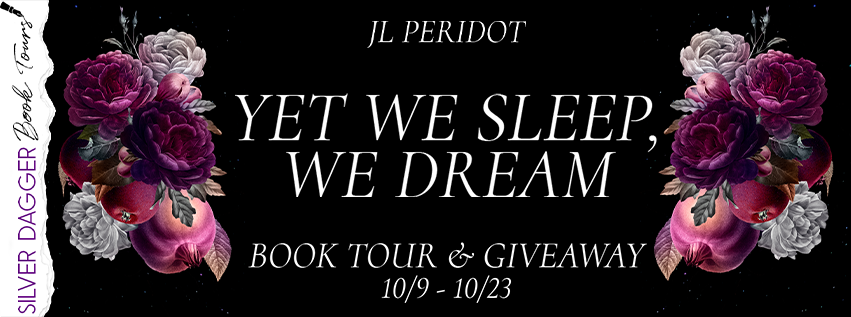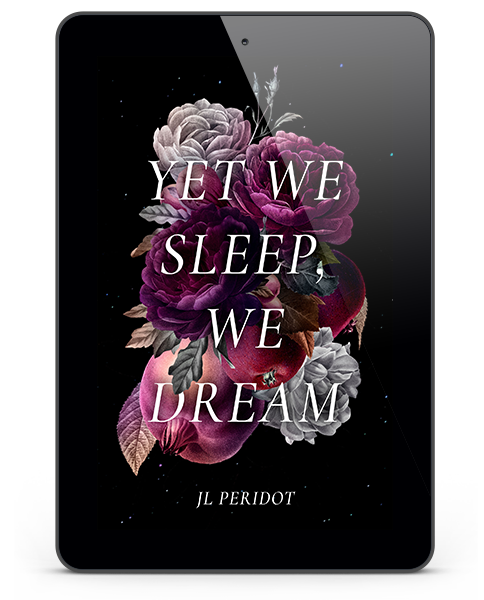A romantic space fantasy re-telling of A Midsummer Night's Dream.
Yet We Sleep, We Dream
by JL Peridot
Genre: Scifi Fantasy Romance, Shakespearean Retelling
Love triangles get bent out of shape when restless gods come out to play.
Relationships are complicated enough when only humans are involved — something the crew of the starship Athenia know plenty about. These children of a changing climate are no strangers to conflicts of the heart. And it seems there's a lot of conflict going on, even out in space.
When an alien dust finds its way on board, the veil between realms begins to fray. Old gods of a long dead planet resume their own romantic bickering while ancient magic wreaks havoc across the ship. Grudges resurface, friends turn to enemies, unrequited love turns to passion — or does it? It's kinda hard to tell with everyone at each other's throats.
Gentles, perchance you wonder at this show; but wonder on, till truth make all things plain. Yet We Sleep, We Dream is a romantic space-fantasy inspired by Shakespeare's endearing hot mess, A Midsummer Night's Dream.
"I have had a most rare vision. I have had a dream, past the wit of man to say what dream it was." — Bottom, A Midsummer Night's Dream
Content guidance: This book contains strong language, drug use, on-page sexual encounters, references to bullying, references to harassment and infertility, depictions of perilous situations, depictions of marital disharmony, awkward social situations, and technical language.
Contains:
*Friends to lovers
*Second chances
*Aussies in space (casual swears)
*Sex, weed & waking dreams
*Hot robot love action
Amazon * Apple * B&N * Kobo * Smashwords * Books2Read * Bookbub * Goodreads
Tracy stops in her tracks. “What in the ever-living . . .”
The loading bay is thick with red haze. That’s a plus—it means they still have air. Tracy counts the crew.
One: Nick Button, crouching at the wall console. He squints over his shoulder at her, a rag covering his nose and mouth, then goes back to punching buttons. Readout shows a Code Orange for this entire deck, but the kid’s alive and moving. Check.
Two: Damian Chandrasekhar trips over his own feet, scrambling to gather scattered fragments of rock onto a bright blue tarp. He ducks and dodges the five drones swerving in chaotic head-height trajectories around the bay. Two of them collide and back off, only to find another flight path into each other. Chandrasekhar slaps one aside and drops an armload of rocks onto his boots. But he’s alive too. Check.
Three: Mia Tan, the smart-arsed heiress to the Tan–Song media empire, the university’s top-tier sponsor. When the DVC said to keep an eye on her, Tracy never dreamed that would mean reigning her in when she runs off at the mouth or decides to take a prank too far. Now the heiress clutches her hand-cam while coughing lungfuls of dust into her elbow—a temporary reprieve for anyone who’s had enough of her verbal barrage. Check.
Four: Aaron fucking Lee, the goddamned ex-husband. Who really should know better than to have nobody standing by the backup controls. Check.
Tracy punches the annexe console. Helena Armstrong and Olek Kovalenko are accounted for in other sectors—check and check. No bodies in space. One crisis averted.
“Button, shut the goddamned inner door!” she barks, glaring at the exposed doorway between the loading bay and the room she’s in. “And get the air filters going.”
“I’m trying, Captain, but it’s not working. Nothing’s happening.”
“God damn it. All right, everyone out!”
Chandrasekhar holds up a corner of the tarp. “I’ll just get this cleaned up, Captain Nielsen!”
“You’ll do as I say, Crewman Chandrasekhar. Out—now.”
A love letter to our future
Australia’s climate has warmed by an average of 1.4°C since national records began in 1910. We’ve seen increases in sea surface temperatures, more heatwaves and bushfires, rising ocean levels and acidity, and decreased snow in our alpine regions.
That’s a lot to take in. And if we do nothing to reduce our carbon emissions, these changes are only going to intensify. Of course, government and industries are doing something now, but who knows what difference that’ll make at a global scale? What do we lose if it’s too little too late? Thinking about all this is alarming and depressing.
But it helps to imagine a future, even if it’s not a perfect future. Just knowing humanity can persevere and keep trying … well, it helps.
Yet We Sleep, We Dream imagines University students on a summer excursion in deep space, studying a dead planet that never survived its Anthropocene. But in the dust and ashes of that once-great civilisation, the students find hope for their own warming world.
It’s a love letter to our future — and pure fantasy of course. I don’t believe that magic and gods and semi-sentient robots will save us. Only we can do that by caring for ourselves, for each other, and for the world in which we live.
Want to learn how to care for the planet?
Start by finding your climate superpowers — that’s all a first step needs to be. Many people mistakenly believe they need to open with big dramatic actions, but massive changes mainly need to happen at the government, industry and billionaire level. For people like you and me, it’s about small, sustainable, ongoing actions that add up to a collective effort from the whole community.
Add solarpunk to your reading list. Solarpunk is a hopeful fiction genre and lifestyle movement that embraces technology in harmony with society and environment. If you’ve ever needed fiction to pull you out of your climate anxiety, solarpunk will be the one to do it. For newcomers to the genre, I recommend Tomorrow’s Parties: Life in the Anthropocene, a short story anthology edited by Jonathan Strahan. Have tissues on hand; some stories are beautiful enough to make you cry 🥲
If you live around nature, learn about the plants around you and go deeper on the ones that are native to your region. Learn about their history and role in the ecosystem. You’ll unearth incredible hidden knowledge about the home just beyond your home. It’s a fascinating way to develop nature smarts and connect with the Earth.
Finally, look for one thing you can do that’s greener or more supportive of your local community. Keep it practical and within your budget. Do it deliberately and own it, and once you’re comfortable having conversations about it, know that you’re helping build a stronger and more caring culture by doing so.
JL Peridot writes love letters to the future on devices form the past. She's a qualified computer scientist, former website maker, amateur horticulturist, and sometimes illustrator. But most of the time, she's an author of romantic science fiction. She lives with her partner and fur-family in Boorloo (Perth, Australia) on Whadjuk Noongar country.
Visit her website at jlperidot.com for the full catalogue of her work.
Website * Newsletter * Bookbub * Goodreads
Follow the tour HERE for special content and a giveaway!
$20 Amazon









No comments:
Post a Comment
I try to get comments published as quickly as possible. I don't always reply to comments on my blog, but I do try to visit as many people as possible when I participate in blog hops and I share links where possible to Twitter, Facebook, Pinterest, and such so others can discover your work. I do read and appreciate your comments.